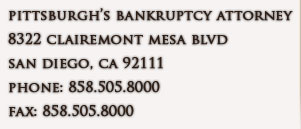
- Bankruptcy
- Bankruptcy During Divorce
- Business Bankruptcy
- Chapter 11 Bankruptcy
- Chapter 13 Bankruptcy
- Chapter 7 Bankruptcy
- Credit Card Debt Relief
- Credit Counseling
- Credit Repair
- Debt Collection Harassment
- Debt Consolidation
- Debt Relief Options
- Discharging Student Loans
- Home Foreclosure
- How Bankruptcy Filing Works
- Medical Bankruptcy
- New Bankruptcy Laws
- Personal Bankruptcy
- Should You Declare Bankruptcy
- Wage Garnishment



Pittsburgh Business Bankruptcy Attorney
If you are a business owner with a company unable to pay back debt, filing for bankruptcy may be the best option for you.
Filing for bankruptcy does not necessarily mean that a business is failing or is going to shut down. Business owners have a couple of different bankruptcy options; if you are business owner you may choose between a Chapter 7 or Chapter 11 filing.
Filing for a Chapter 7 business bankruptcy is asking for a basic liquidation of assets. The court will appoint a Chapter 7 Trustee to look into your business’ assets and decide what should be done pay back your business’s creditors. The trustee may wish that you temporarily stop functioning as a business until he or she finishes reviewing your assets. Your Chapter 7 Trustee will then decide what to do with your business’ assets, such as selling stock options, machinery, or real estate to pay back debts to creditors. If there is an excess of funds after your debts have been paid, the funds will be returned to the corporation.
You may also choose to file for a Chapter 11 bankruptcy, which is similar to a Chapter 7 bankruptcy in all ways except for the business remains in primary control of its finances. You and your board of directors may go through your assets on your own and submit a repayment plan to the court for approval.
The Pittsburgh Bankruptcy Attorney is an experienced financial attorney that can improve even the most destitute of financial situations. If your business is teetering on the edge of financial ruin, our legal team can help you figure out the best route possible to overcoming your debt. Contact us today for a free initial consultation with the Pittsburgh Bankruptcy Attorney.